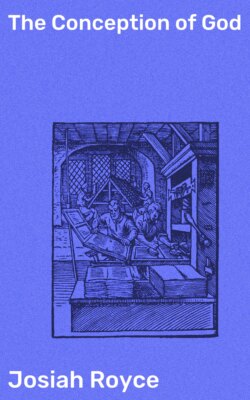Читать книгу The Conception of God - Josiah Royce - Страница 5
Footnotes
Оглавление1 ↑ Professor Royce designates this view Ethical Realism. Professor Howison has no particular objection to this title, as it names, quite appropriately, an actual aspect of the doctrine. He would himself willingly call it Absolute Idealism (as in his opinion the only system expressing completely the Ideal of the Reason, and reaching an ideal that per se turns real), were not that name already associated—illegitimately, as he holds—with the theory of Hegel, and so with Professor Royce’s own. Absolute Idealism, of course, however interpreted, must also be called Absolute Realism. Accordingly, Ethical Idealism is in its reverse aspect Ethical Realism.
2 ↑ The pervasion of pure literature by this fascinating theme must not be overlooked in recounting the causes of its present prevalence. It has filled, especially, almost the whole realm of Poetry, from the days of Goethe. The English poetry of the century is alive with it: Wordsworth, Shelley, Keats, Tennyson, Browning, Arnold—it seems the ceaseless refrain of all their song. Nor, to turn to the essayists, may we forget Carlyle; nor, in his theistic moods, Emerson.
3 ↑ See pp. 123–127 below.
4 ↑ The editor, for his part, feels much regret that the limits of the volume have forbidden the insertion of Professor Mezes’s rejoinder in full. Its unavoidable length precluded its appearance as a whole, while the close articulation of its parts made impracticable any excerpts that would do it justice. It is to be hoped the public may see it elsewhere, and in a less restricted and more adequate form than its author was constrained to give it in his communication to the editor.
